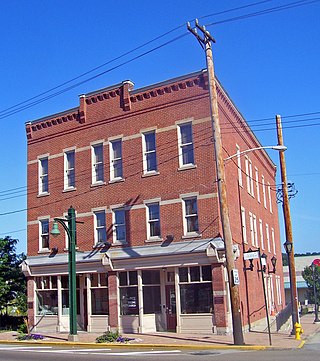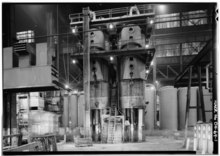
Homestead is a borough in Allegheny County, Pennsylvania, United States, along the Monongahela River 7 miles (11 km) southeast of downtown Pittsburgh. The borough is known for the Homestead strike of 1892, an important event in the history of labor relations in the United States. The population was 2,884 at the 2020 census. It is part of the Pittsburgh metropolitan area.

West Homestead is a borough in Allegheny County, Pennsylvania, United States, 8 miles (13 km) southeast of Pittsburgh, on the Monongahela River. Heavy industries associated with nearby steel mills existed here, such as axle works, brickworks, and manufactories of machinery, car wheels, etc. The largest concern was Mesta Machinery, which was one of the world's leading industrial manufacturers from 1898 until 1983. The population was 1,872 at the 2020 census.

The history of Pittsburgh began with centuries of Native American civilization in the modern Pittsburgh region, known as Jaödeogë’ in the Seneca language. Eventually, European explorers encountered the strategic confluence where the Allegheny and Monongahela Rivers meet to form the Ohio, which leads to the Mississippi River. The area became a battleground when France and Great Britain fought for control in the 1750s. When the British were victorious, the French ceded control of territories east of the Mississippi.

A factory, manufacturing plant or production plant is an industrial facility, often a complex consisting of several buildings filled with machinery, where workers manufacture items or operate machines which process each item into another. They are a critical part of modern economic production, with the majority of the world's goods being created or processed within factories.

The Homestead strike, also known as the Homestead steel strike, Homestead massacre, or Battle of Homestead, was an industrial lockout and strike that began on July 1, 1892, culminating in a battle in which strikers defeated private security agents on July 6, 1892. The governor responded by sending in the National Guard to protect strikebreakers. The dispute occurred at the Homestead Steel Works in the Pittsburgh-area town of Homestead, Pennsylvania, between the Amalgamated Association of Iron and Steel Workers and the Carnegie Steel Company. The final result was a major defeat for the union strikers and a setback for their efforts to unionize steelworkers. The battle was a pivotal event in U.S. labor history.

The United States Steel Corporation is an American steel company based in Pittsburgh, Pennsylvania, with production facilities in the U.S. and Central Europe.

Samuel Slater was an early English-American industrialist known as the "Father of the American Industrial Revolution", a phrase coined by Andrew Jackson, and the "Father of the American Factory System". In the United Kingdom, he was called "Slater the Traitor" and "Sam the Slate" because he brought British textile technology to the United States, modifying it for American use. He memorized the textile factory machinery designs as an apprentice to a pioneer in the British industry before migrating to the U.S. at the age of 21.

Henry Clay Frick was an American industrialist, financier, and art patron. He founded the H. C. Frick & Company coke manufacturing company, was chairman of the Carnegie Steel Company and played a major role in the formation of the giant U.S. Steel manufacturing concern. He had extensive real estate holdings in Pittsburgh and throughout the state of Pennsylvania. He later built the Neoclassical Frick Mansion in Manhattan, and upon his death donated his extensive collection of old master paintings and fine furniture to create the celebrated Frick Collection and art museum. However, as a founding member of the South Fork Fishing and Hunting Club, he was also in large part responsible for the alterations to the South Fork Dam that caused its failure, leading to the catastrophic Johnstown Flood. His vehement opposition to unions also caused violent conflict, most notably in the Homestead Strike.

Allis-Chalmers was a U.S. manufacturer of machinery for various industries. Its business lines included agricultural equipment, construction equipment, power generation and power transmission equipment, and machinery for use in industrial settings such as factories, flour mills, sawmills, textile mills, steel mills, refineries, mines, and ore mills.

The Strip District is a neighborhood in Pittsburgh, Pennsylvania, United States. It is a one-half square mile area of land northeast of the central business district bordered to the north by the Allegheny River and to the south by portions of the Hill District. The Strip District runs between 11th and 33rd Streets and includes four main thoroughfares—Railroad Street/Waterfront Place, Smallman Street, Penn Avenue, and Liberty Avenue—as well as various side streets.

Perle Reid Mesta was an American socialite, political hostess, and United States ambassador to Luxembourg (1949–53).

Homestead Steel Works was a large steel works located on the Monongahela River at Homestead, Pennsylvania in the United States. The company developed in the nineteenth century as an extensive plant served by tributary coal and iron fields, a railway 425 miles (684 km) long, and a line of lake steamships. The works was also the site of one of the more serious labor disputes in U.S. history, which became known as the Homestead strike of 1892.

The U.S. Steel recognition strike of 1901 was an attempt by the Amalgamated Association of Iron, Steel and Tin Workers to reverse its declining fortunes and organize large numbers of new members. The strike failed.

Amalgamated Association of Iron and Steel Workers (AA) was an American labor union formed in 1876 to represent iron and steel workers. It partnered with the Steel Workers Organizing Committee of the CIO, in November 1935. Both organizations disbanded May 22, 1942, to form a new organization, the United Steelworkers.

The Edgar Thomson Steel Works is a steel mill in the Pittsburgh area communities of Braddock and North Braddock, Pennsylvania. It has been active since 1875. It is currently owned by U.S. Steel and is known as Mon Valley Works – Edgar Thomson Plant.
Before 1800 A.D., the iron and steel industry was located where raw material, power supply and running water were easily available. After 1950, the iron and steel industry began to be located on large areas of flat land near sea ports. The history of the modern steel industry began in the late 1850s. Since then, steel has become a staple of the world's industrial economy. This article is intended only to address the business, economic and social dimensions of the industry, since the bulk production of steel began as a result of Henry Bessemer's development of the Bessemer converter, in 1857. Previously, steel was very expensive to produce, and was only used in small, expensive items, such as knives, swords and armor.

The economy of Pittsburgh, Pennsylvania is diversified, focused on services, medicine, higher education, tourism, banking, corporate headquarters and high technology. Once the center of the American steel industry, and still known as "The Steel City", today the city of Pittsburgh has no steel mills within its limits, though Pittsburgh-based companies such as US Steel, Ampco Pittsburgh and Allegheny Technologies own several working mills in the Pittsburgh metropolitan area.
Volkswagen Westmoreland Assembly was a manufacturing complex located 35 miles (56 km) southeast of Pittsburgh in Westmoreland County, Pennsylvania, near New Stanton — and noted for manufacturing 1.15 million Volkswagens from 1978 until 1987. When VWoA began manufacturing in the unfinished Chrysler plant, it became the first foreign automobile company to build cars in the US since Rolls-Royce manufactured cars in Springfield, Massachusetts, from 1921 to 1931.

Waitt & Bond, Inc. was an American cigar manufacturer that was in operation from 1870 to 1969. During the early 20th century it was the largest cigar manufacturer in New England and one of the largest in the United States.

Birdsboro Steel was an American producer of steel, machines, and machine parts based in Birdsboro, Pennsylvania. The company also produced munitions, tanks, and artillery in the late 1940s through their subsidiary company, Armorcast. Though the company wasn't officially established until around 1867, the roots of the company go as far back as 1740


















